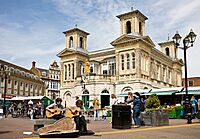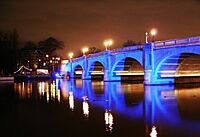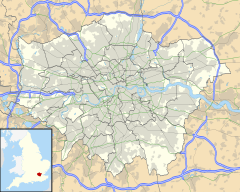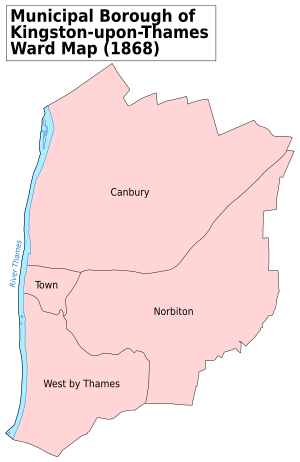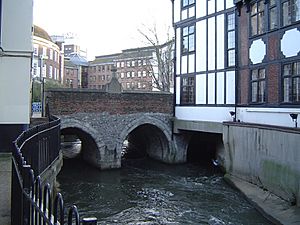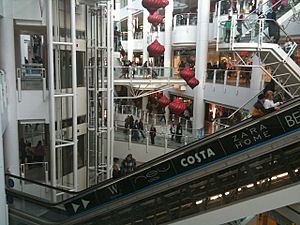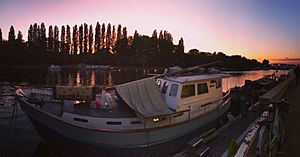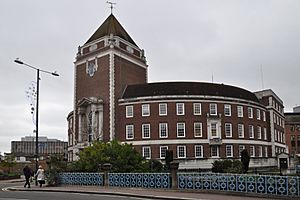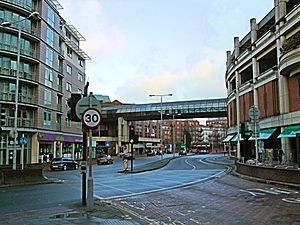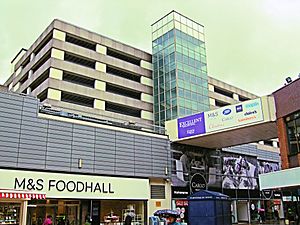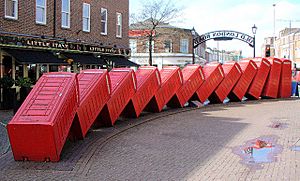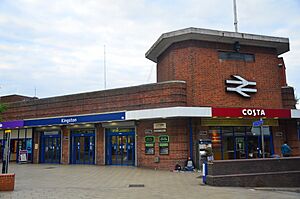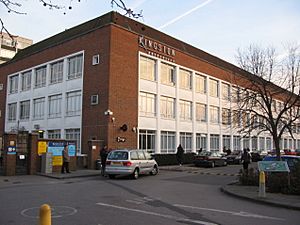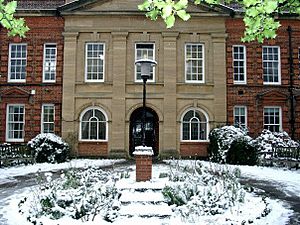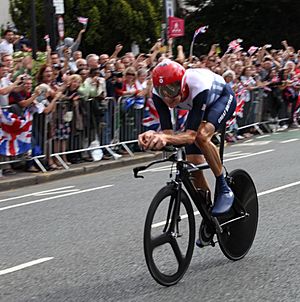Kingston upon Thames facts for kids
Quick facts for kids Kingston upon Thames |
|
|---|---|
|
Clockwise from top: Kingston Market Square; Church Street; Kingston Bridge at night; Shrubsole Memorial water fountain |
|
| Population | 54,925 (Post town) 168,063 (Borough) |
| OS grid reference | TQ182693 |
| • Charing Cross | 10.0 mi (16.1 km) NE |
| London borough | |
| Ceremonial county | Greater London |
| Region | |
| Country | England |
| Sovereign state | United Kingdom |
| Post town | KINGSTON UPON THAMES |
| Postcode district | KT1, KT2, KT3, KT4 |
| Dialling code | 020 |
| Police | Metropolitan |
| Fire | London |
| Ambulance | London |
| EU Parliament | London |
| UK Parliament |
|
| London Assembly |
|
Kingston upon Thames, often called Kingston, is a town in south-west London, England. It sits right on the River Thames, about 16 kilometres (10 miles) south-west of central London. Kingston is a very old market town. It's famous because several Saxon kings were crowned here a long time ago.
Historically, Kingston was part of Surrey county. It was a very old town that got its official town status in 1441. From 1893 to 2020, Kingston was the main office for Surrey County Council. In 1965, Kingston became part of Greater London and is now one of the 32 London boroughs.
Today, Kingston is a major shopping area in the UK. It welcomes about 18 million visitors every year! It's also home to Kingston University. The town's main postcode areas are KT1 and KT2. The wider area, called the Royal Borough of Kingston upon Thames, has a population of over 168,000 people.
Contents
What's in a Name?
Kingston's name has changed a bit over time. In 838 AD, it was called Cyninges tun. This Old English name means 'the king's manor or estate'. It was called this because it belonged to the king during Saxon times. It was also the very first royal town.
For a long time, people argued if the name should be 'Kingston-on-Thames' or 'Kingston upon Thames'. They also wondered if it should have hyphens. The Post Office used 'Kingston-on-Thames', but the Ordnance Survey used 'Kingston upon Thames'. When the modern London Borough was created in 1965, they decided on 'Kingston upon Thames' without hyphens. This is the name used today.
Kingston's Story
Early Days
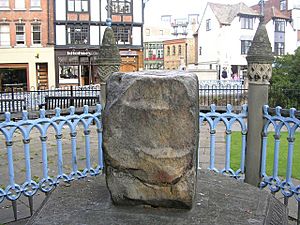
Kingston was first mentioned in 838. It was the meeting place for King Egbert of Wessex and the Archbishop of Canterbury. Kingston was important because it was on the border between two old kingdoms, Wessex and Mercia. Later, King Athelstan united them to create England.
Because of its special location, several kings were crowned in Kingston in the 900s. These included Æthelstan in 925 and Æthelred in 978. It was believed that these coronations happened in a chapel that collapsed in 1730. A large stone found in the ruins is now known as the Coronation Stone. You can see it today in the grounds of the guildhall.
Growth and Industry
For most of the 1900s, Kingston was a big centre for making military aircraft. Famous planes like the Sopwith Camel, Hurricane, and Harrier were designed and built here. Important aviation people like Sydney Camm and Harry Hawker worked in Kingston.
The aircraft factory closed in 1992. Part of the area was used for new homes and a sports centre. Also, Kingston Polytechnic grew into Kingston University. This made Kingston a true university town.
Local Government Changes
Kingston upon Thames was a very old parish in Surrey. It covered a large area, including places like New Malden and Surbiton. The town of Kingston received its first official document, called a charter, from King John in 1200. This document is still kept in the town's archives.
In 1481, King Edward IV gave Kingston the status of a borough. This meant it had its own local government. In 1927, King George V confirmed that Kingston could be called a "Royal Borough."
In 1965, the local government in Greater London was changed. Kingston joined with nearby towns like Surbiton to form the new London Borough of Kingston upon Thames. Queen Elizabeth II allowed the new borough to keep the "Royal Borough" title.
Town Development
Kingston was built at the first place where you could cross the River Thames upstream from London Bridge. A bridge still stands in the same spot today. This "great bridge" made Kingston very important in the 1200s.
The Romans lived here, and later it was a royal home or estate. The town is mentioned in the Domesday Book, a famous survey from 1086. It had a church, five mills, and fisheries.
In 1309, a chapel called the Lovekyn Chapel was built. It's the only private chapel from that time to still exist after the Reformation. When the railway arrived in the 1830s, the area south of the town grew a lot. This led to the creation of the new town of Surbiton.
How Kingston is Governed
Kingston is part of two areas for the UK Parliament. The northern part of the town is in the Richmond Park area. The southern part, including the old town centre, is in the Kingston and Surbiton area. Both areas are currently represented by Members of Parliament from the Liberal Democrats party.
Places to See
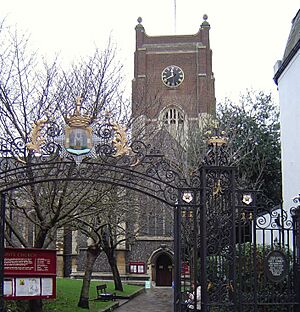
Central Kingston is a busy area, mostly for shopping. Many streets are for pedestrians only.
You'll find a big shopping mall called "The Bentall Centre". It has the Bentalls department store and many other popular shops. There's also a large John Lewis department store. Another shopping centre nearby is Eden Walk. The Rotunda, a round building, has a bowling alley, a gym, and a 15-screen cinema.
The old market still runs every day in the Market Place. You can buy fresh produce, fish, jewellery, and flowers there.
Kingston has several important public buildings. These include the Kingston Museum, a public library, and the Guildhall. The Guildhall is where the Kingston Council meets. Nearby is the County Hall Building, which used to be the main office for Surrey County Council.
The River Thames is a great open space in Kingston. Its banks are lined with lively bars and restaurants. You can walk along the river through Canbury Gardens or towards Surbiton.
Kingston's Economy
Kingston has many pubs and restaurants. Some old pubs have been turned into restaurants or bars. You can find traditional pubs in the northern part of town. There are also many Chinese, Indian, Thai, and Italian restaurants.
The local newspapers are the weekly Surrey Comet and the Kingston Guardian.
Kingston is one of the biggest retail centres in the UK. In 2010, it was ranked 25th in the UK for retail spending. This means it's a very important place for shopping in London, after only a few areas in the West End.
In 2013, Kingston started its own local currency called the Kingston Pound. This was to help local businesses. It was a digital currency at first, then paper money from 2018 to 2021. These special notes are now popular with collectors.
Culture and Arts
Kingston has a great theatre called the Rose Theatre. It opened in 2008 and can seat about 900 people. The audience sits around a semi-circular stage. All Saints Church hosts classical music concerts. There are also many local choirs and music groups.
The Council and Kingston Arts Council organize annual festivals. These include the Kingston Readers' Festival and the Festival of the Voice. Kingston University has the Stanley Picker Gallery, and Kingston Museum has changing art exhibits.
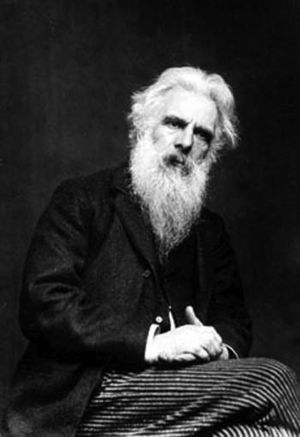
Many famous writers and artists have links to Kingston. John Galsworthy, who wrote books, was born on Kingston Hill. Jacqueline Wilson, a popular children's author, grew up and went to school in Kingston and still lives there.
Eadweard Muybridge, a pioneer in photography and moving pictures, was also born in Kingston. He even changed the spelling of his first name because of the Saxon kings crowned here!
Kingston has appeared in books, films, and TV shows. The funny Victorian novel Three Men in a Boat by Jerome K. Jerome starts here. In H. G. Wells' The War of the Worlds, cannons are placed on Kingston Hill.
The famous guitarist Eric Clapton used to play music on the streets of Kingston when he was starting out. The rock band Cardiacs was formed here.
A scene from the Bollywood film Mujhse Dosti Karoge was filmed by the "Out of Order" telephone box sculpture. The TV show Doctor Who and Primeval have also filmed scenes in Kingston, including inside the Bentall Centre. Nipper, the famous "His Master's Voice" (HMV) dog, is buried under Lloyds Bank in the town.
Public Art
One of Kingston's most unusual sights is a sculpture called Out of Order by David Mach. It's made of twelve old red telephone boxes that are tipped over, leaning against each other like dominoes. It was created in 1988.
Getting Around Kingston
Train Travel
Kingston's main train station is Kingston railway station, which opened in 1863. Trains from here go to London Waterloo, connecting Kingston to places like Wimbledon and Clapham Junction. You can also catch trains to Shepperton and around the Kingston loop line towards Richmond.
Nearby, Surbiton station is also served by trains from Waterloo. From Surbiton, you can travel to places in Surrey and Hampshire, such as Hampton Court and Guildford. Surbiton station's building is quite famous for its Art Deco design from 1937.
Bus Services
Kingston has two bus stations, Cromwell Road and Fairfield. Many bus stops are also around the town. Buses connect Kingston to places all over Greater London and Surrey, including direct links to Heathrow Airport.
Roads and Driving
The Kingston Bypass runs around the south and east of the town. This road is part of the A3, which connects Kingston to central London in the north and Portsmouth in the south.
In the late 1980s, the Kingston Relief Road was built. This road goes around the town centre, making it easier for major shopping streets like Clarence Street to be for pedestrians only. Part of this road goes under the John Lewis Kingston store and crosses the River Thames over Kingston Bridge.
River Travel
You can take river tours from Kingston Town End and Kingston Turks piers. Turk Launches offers tours between Hampton Court and Richmond during the summer.
Cycling Routes
Kingston has many cycle lanes. These connect the area to places across south-west London and England.
One important route is National Cycle Route 4. This route goes from Greenwich in south-east London all the way to St David's in west Wales. Near Kingston, it follows the River Thames and crosses Kingston Bridge.
Learning in Kingston
Kingston is home to Kingston University and Kingston College. There are several primary schools in the town, such as Latchmere School and King Athelstan School. For secondary education, Kingston has schools like The Kingston Academy, Tiffin School, and Tiffin Girls' School. These schools are very popular and attract students from a wide area.
The growth of Kingston University has made Kingston a lively university town.
Places of Worship
The 12th-century Church of All Saints is a Church of England parish church. There has been a church in Kingston since at least 838. Other Anglican churches include St John the Evangelist and St Luke.
For Roman Catholics, there is a church dedicated to Saint Agatha. Kingston also has a Quaker meeting house, a Mosque, and a Sikh Gurdwara.
Sports and Activities
Kingston is home to several football clubs. Chelsea F.C. Women play at the Kingsmeadow Stadium. Other clubs include Corinthian-Casuals and Kingstonian.
The Kingston Athletic Club and Polytechnic Harriers are based at the Kingsmeadow athletics stadium, which has a 400m track and a gym. Kingston Rugby Club is on the edge of town. Kingston Rowing Club, founded in 1858, is in Canbury Gardens on the River Thames. The club holds two big races each year, and the Kingston Regatta takes place in early July.
The Kingfisher Centre is a large leisure centre with an indoor swimming pool and gym. Kingston Wildcats School of Basketball is a local club that plays in the Surrey League.
London 2012 Olympics
Before the 2012 Olympic Games in London, Kingston hosted the Olympic torch relay twice. The flame travelled through the borough on its way to the Olympic Stadium.
Kingston was also the setting for four cycling events during the Olympics. These included the men's and women's road races and time trials. After the Olympics, a professional bicycle race called the London–Surrey Classic ran through the town for several years, using a similar route to the Olympic race.
Kingston's Neighbours
Kingston is about 5 kilometres (3 miles) south-east of Twickenham and 8 kilometres (5 miles) north-east of Walton-on-Thames.
Twin Towns
Kingston upon Thames is twinned with Oldenburg in Germany. It has also been historically twinned with Delft in the Netherlands. Since 2016, Kingston upon Thames has also been twinned with Jaffna in Sri Lanka.
Famous People from Kingston
Many notable people have come from Kingston upon Thames. You can find a full list in the article List of people from Kingston upon Thames.


